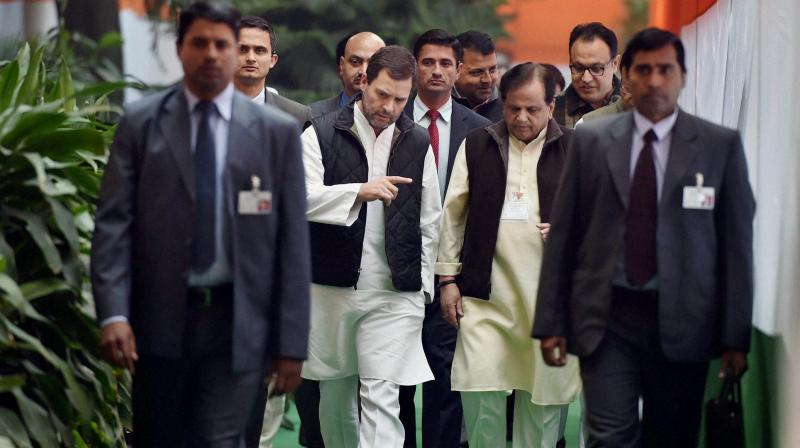Indispensable old guard and new poll tactics
Ahmed Patel's name crops up in party meetings given the crucial backroom role he plays in organisational matters.

When Sonia Gandhi’s political secretary Ahmed Patel rang up other Opposition leaders to invite them for a joint press conference in Delhi last week, it was assumed that he was calling on behalf of the Congress president and that she would be presiding over the meeting. As it turned out, Rahul Gandhi was the party’s lead representative at this meeting, which was initiated by the Congress vice-president. Ever since Mr Gandhi started playing a larger role in party affairs, there has been considerable speculation about the choice of his team members, specially his political secretary. At the same time, the party has also been agog about the role of the old guard (as Mrs Gandhi’s advisers are called) in the new set-up. Mr Patel’s name invariably crops up in these conversations given the key position he holds in the Congress president’s office and the crucial backroom role he plays in organisational matters. If last Tuesday’s meet is any indication, Mr Gandhi has to necessarily turn the senior leaders to bail him out when tackling important issues. Clearly, nobody in his team has the seniority or the gravitas to pick up the phone and talk to Trinamul Congress chief Mamata Banerjee or Rashtriya Janata Dal president Lalu Prasad Yadav. Whatever the outcome of the meeting, what has clearly emerged from it is that the party needs leaders like Mr Patel to do its heavy lifting.
When the Narendra Modi government picked Lt. Gen. Bipin Rawat as the next Army Chief by superseding two senior officers, the ruling Bharatiya Janata Party urged critics not to politicise the armed forces by questioning the Centre’s motives. Despite the unofficial explanations put out by the defence ministry about why the government had ignored the legitimate claims of the two senior officers, few were convinced that there was no political motive behind this appointment. Delhi’s political grapevine is abuzz with speculation that Lt. Gen. Rawat was chosen with an eye on next year’s Uttarakhand Assembly polls. It is no coincidence that the new Army Chief, the new chief of the Research and Analysis Wing Anil Dhasmana and national security adviser Ajit Doval are all from the Garhwal region of Uttarakhand. Apparently, the BJP plans to showcase these appointments to play up the divide between the Kumaon and Garhwal regions in the forthcoming elections by running a campaign against Uttarakhand chief minister Harish Rawat for giving greater preference to Kumaon. In doing so, the BJP hopes to make political gains in the Garhwal region which has more Assembly seats, specially since the Congress chief minister has been under attack for meting out step-motherly treatment to this area.
Before Congress vice-president Rahul Gandhi launched his Kisan Yatra in poll-bound Uttar Pradesh last September, the party had declared with great fanfare that former Delhi chief minister Sheila Dikshit would be projected as its chief ministerial face in the Hindi heartland state. At the same time, it rejigged its state unit and appointed actor-turned-politician Raj Babbar as the Uttar Pradesh Congress president in a bid to energise its cadres before the elections. But, as it happens, the campaign soon ran out of steam once it became clear that the Congress is making no impact on the ground. Similarly, the initial enthusiasm displayed by Ms Dikshit and Mr Babbar has also waned. Uttar Pradesh Congress leaders complain that it is impossible to meet Ms Dikshit and Mr Babbar as they visit the state only occasionally. Even when they do travel to Uttar Pradesh, it is at best a guest appearance because they disappear after putting in a brief appearance. Mr Babbar, they maintained, never comes to the party office in Lucknow and sets up appointments with party workers at odd hours and at secret venues. He behaves more like an abhineta instead of a neta, grumbled a Congress leader from Uttar Pradesh.
Unlike other political leaders, Bharatiya Janata Party president Amit Shah has his own style of managing party affairs. For instance, every party chief sets up a system to mollify unhappy leaders. This is particularly so in election-bound states as the distribution of tickets invariably leads to dissension in the ranks. The party leadership generally has a backup plan to deal with such contingencies so that the unhappy leaders do not sabotage an election. But an impatient Shah has no time for such niceties. He has made it clear on several occasions that his decisions are final and those who are not in agreement with him are free to leave. Recently, when it was suggested that it may be good idea if Mr Shah were to placate some senior disgruntled leaders in the poll-bound states of Uttar Pradesh and Uttarakhand, his response was on expected lines, “I don’t have to worry about such people. All I have to do is to send out a message to the cadres that a particular leader does not enjoy my confidence... his supporters in the party will immediately desert him.”

